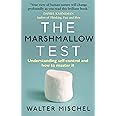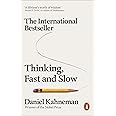


The Marshmallow Test: Understanding Self-control and How To Master It
Description
The Marshmallow Test: Understanding Self-control and How To Master It
Reviews
E**Y
A prefrontal ant or limbic grasshopper?
Focused on the ‘marshmallow test’ first developed in the 60s (a prize right away, or double the prize if you wait), this fascinating book draws from the author’s years of experience and many dozens of studies by various mostly American researchers looking at self-control and how it is and can be influenced. The marshmallow test, taken at an early age, has been proven to indicate our performance in later years. One study found that each additional minute of avoidance corresponded to a reduction of BMI of 0.2 in adulthood. What determines our reactions to temptation, to look away from a chocolate, to give up smoking, or prepare for a pension? The book looks at the interplay between nature and nurture in developing self-control as well as its development with age and experience. The brain turns out to have ‘hot’ and ‘cold’ neural systems that compete with each other, and these can even be monitored using fMRI scanning techniques and correlated with resulting actions. ‘Hot’ reactions can be physically damaging; for example, rumination increases blood pressure (we learn that pain killers even alleviate emotional pain). ‘Self-control’ is the operative phrase. People can be monitored or monitor themselves in order to discover when they tend to lose self-control, for example in friendly or confrontational environments with peers or an authority figure. Cognitive behaviour therapy can be employed to get us to overcome fears, for example crossing tall bridges or going into open spaces. People who have a track record of exhibiting high self-control in one environment may not do so in another (viz. past personal foibles of personalities such as President Clinton, Tiger Woods, and General Petraeus). We do have a psychological immune system to help us defend against ‘hot’ reactions. In those of us where it is stronger we tend to overrate ourselves and stay healthier. ‘Hot’ and ‘cold’ reactions shape our way of thinking. We have either ‘fixed’ or ‘growth’ mind-sets, the latter providing us with greater academic success. People with fixed mind-sets tend to externalise their failings, blaming circumstances. People with growth mind-sets are naturally more optimistic and tend to connect with their future selves and live longer. Self-distancing, the ‘fly on the wall’ approach, is a key technique that allows us to analyse our personal traumas. It all boils down to improving our ‘executive function’ (EF), and the good news is that this can be learned. The author cites watching Sesame Street, meditation, or attending one of New Yourk City’s Knowledge is Power Program (KIPP) schools. The right school environment and good role models can influence the nurturing of the appreciation of consequences. Strong EF allows us to keep goals and consequences in mind, monitor and correct, and inhibit impulsive responses. EF can be improved by creating a psychological distance in order to avoid temptation, and it turns out that EF is not only linked to self-control but also imagination and empathising with others. There is a phenomenon called ‘will fatigue’, but this can be controlled, such as is done by Navy Seals and other high performers who have to train themselves to endure impossible situations. But inevitably, all is not necessarily well with people possessing high levels of self-control. They take fewer risks, which may put them at a disadvantage in entrepreneurial decisions or the like. They may also be prone to overconfidence, and the author cites one study that showed that autopsies revealed that physicians’ diagnoses had been wrong 40% of the time. One wonders how other factors in life might overlap, such as using computers or playing computer games, a Montessori education, a tendency for punctuality, or learning a craft.
N**S
Great book full of interesting insights
Great book full of interesting insights and a recommended read. I would've just liked to see clearer strategies and examples about how to foster self-control and delaying gratification.
W**N
interesting take on human nature that might change your way of thinking - and possibly even some of your actions
To summarise the main themes of this book - we can run 'hot' systems or 'cold systems', where the 'hot' system values here and now rewards and the 'cold' system takes an overall view of rewards, present and future. We can see a propensity to start out with a predominating hot or cold system in the marshmallow test that the author developed to study young infants - and which proved to be a strong predictor of success in their future lives. Yes, success means living with the 'cold' system predominating in contemporary life - and maybe always.We can learn to improve Executive Function, and we can for example learn what pushes our 'hot' buttons and prepare for this and avoid the consequences. The rewards can be unexpected - looking at heartbreak from the third person standpoint can be helpful (so can painkillers, Mischel tells us, interestingly, as can focussing on the positive relationships in our lives). But we're not always either 'hot' or 'cold'. You don't get to be President of the US without considerable self-control. But this didn't stop a young intern pushing Bill Clinton's 'hot' buttons - and there are numerous examples of behaviours of this sort.So a really interesting book, then, that could change your ways of thinking about yourself - and might even change the way you act and approach difficult problems. If there was a downside for me, it's that I didn't find Mischel's style of writing - a bit 'down home' with the scholarly stuff in endnotes and with occasional forays into (often interesting) sidelines of thought - all that gripping. Overall though I'd recommend this strongly.
W**S
Fascinating read
I bought the audio version to go along with this book but it's so detailed in places that I'd find myself re-reading paragraphs to make sure I'd understood properly.This is a truly fascinating book, gives insight into your own and other people's behaviour. I see some of why I am in here. It gives me wiggle room to change some future behaviour. It shows how character is built, how effort pays off. It might be an essential tool for parenting.
C**T
Fascinating, empowering, a brilliant aid to taking ownership of your life
I loved this book, the stories it tells and the fascinating conclusions it draws from extensive research about why we behave the way we do and, where that behaviour isn’t in our best interests (eg. Over eating, over drinking, over reacting, over indulging, excessive anger - anything that demonstrates a lack of self control), what we can do to change it.What I loved most: the evidence that our brains are malleable, ie we are not fixed in stone when we are born, but rather can take conscious steps to change our thoughts and our behaviour. In other words, that we have some control over our destiny. My beliefs exactly!What I’ll do differently: this book opened my eyes to the different workings of the brain. How we have a hot system (impulsive, pleasure seeking) and a cool system (rational, future focused). Both are necessary and play different roles and impact on our lives in different ways. Now, when I (my cool system) tell myself I won’t have a glass of wine (immediate temptation) after work because I want to wake up feeling rested in the morning (future benefit), and it gets to after work and I (my hot system) says ‘have a glass of wine! It’s been a long day,’ I’ll try some of the tricks used by the Marshmallow Test kids in this book for resisting the temptation!
Common Questions
Trustpilot
2 months ago
1 month ago



